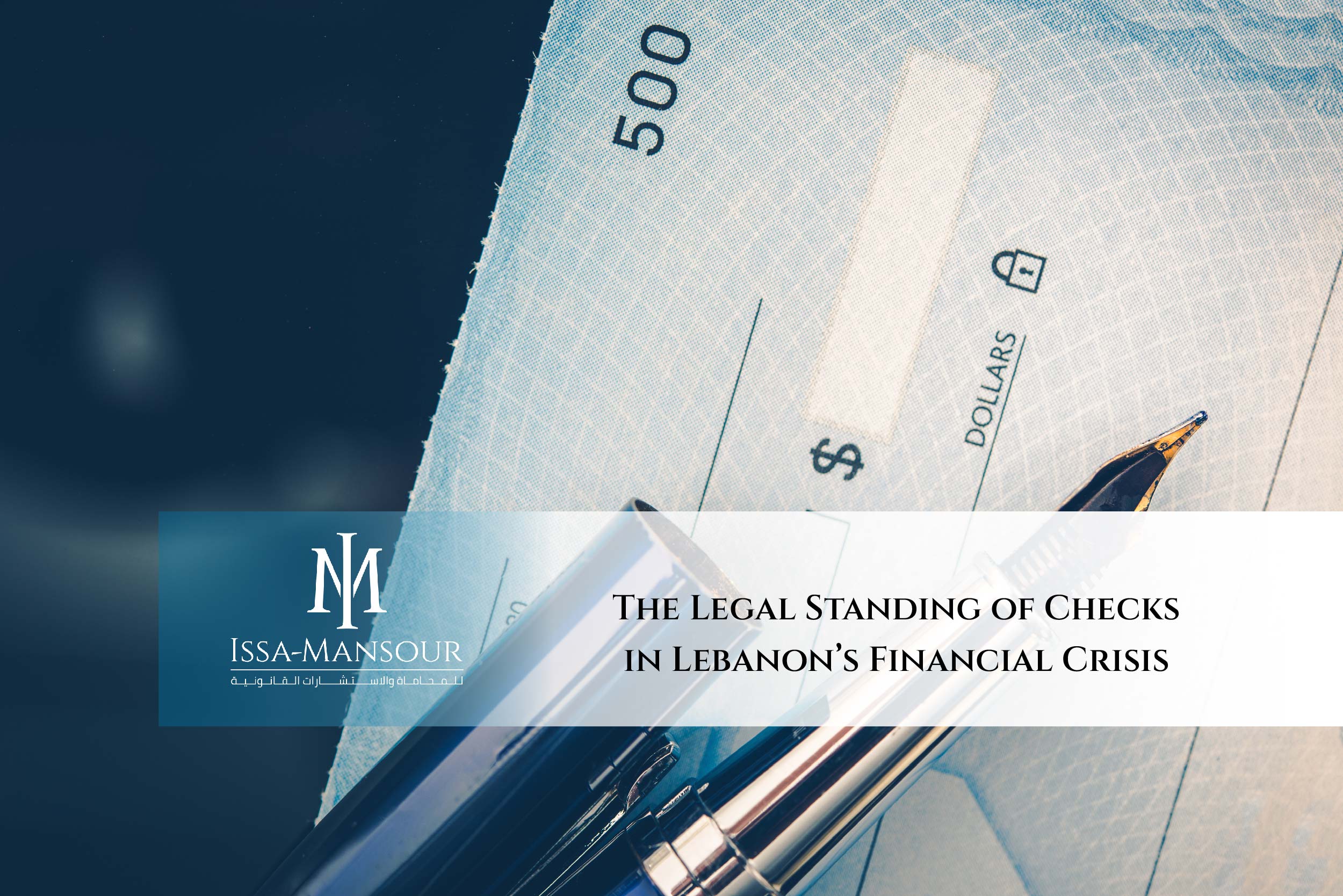Lebanon’s ongoing financial crisis has deeply affected multiple sectors, with the banking system bearing the brunt of the collapse. Confidence in banks has plummeted to historic lows, impacting everything from exchange rates to deposit withdrawals and, more critically, the legal standing of checks as a means of payment.
What Does the Law Say About Checks?
Under the Lebanese Commercial Code, specifically Articles 425 and 431: a check is legally recognized as a means of payment, provided that the creditor can collect its full value in cash. However, the economic turmoil has significantly altered this reality.
Checks in the Current Crisis: A Legal and Practical Dilemma
In light of Lebanon’s financial collapse, many borrowers, especially merchants, have attempted to repay their debts to banks using checks, including those denominated in U.S. dollars. This has led to a legal gray area due to two key issues:
- Checks do not guarantee full cash value: Many judges have ruled that checks, whether in Lebanese pounds or foreign currency, are not a valid means of debt settlement if the creditor cannot withdraw their full value in cash from the bank.
- Market value vs. actual value: The difference between the nominal value of a check and its real purchasing power in the market further complicates its validity as a form of payment.
As a result, Lebanese courts have issued numerous rulings rejecting checks as a sufficient means of debt repayment, arguing that they fail to fully discharge a debtor’s obligations.
Finding a Balanced Legal Approach
This situation presents a complex legal challenge that cannot be addressed through conventional means alone. Based on our extensive courtroom experience, we believe that resolving this issue requires:
- A case-by-case judicial approach that considers both legal interpretation and market realities
- Encouraging settlements that fairly balance the rights of creditors, debtors, and depositors, the individuals whose funds remain trapped in banks
With depositors’ interests at stake, legal and financial reforms must be designed to ensure a fair, practical, and sustainable resolution to this crisis.
الوضع القانوني للشيكات في ظل الأزمة المالية في لبنان
تعاني القطاعات المختلفة في لبنان من تداعيات الأزمة المالية المستمرة، حيث كان القطاع المصرفي الأكثر تضررًا من الانهيار. فقد تراجعت ثقة المودعين بالمصارف إلى أدنى مستوياتها تاريخيًا، مما أثر على أسعار الصرف، وعمليات سحب الودائع، والأهم من ذلك، الوضع القانوني للشيكات كوسيلة للدفع
ماذا يقول القانون عن الشيكات؟
وفقًا لقانون التجارة اللبناني، وتحديدًا المادتين 425 و431، يُعتبر الشيك وسيلة دفع قانونية بشرط أن يتمكن المستفيد من تحصيل قيمته بالكامل نقدًا. ومع ذلك، فإن الواقع الاقتصادي الحالي قد غيَّر هذه القاعدة بشكل جذري
الشيكات في ظل الأزمة: معضلة قانونية وعملية
نتيجة للانهيار المالي، حاول العديد من المدينين، وخصوصًا التجار، تسديد ديونهم للمصارف عبر الشيكات، بما في ذلك الشيكات بالدولار الأميركي. لكن هذا الأمر أوقع النظام القانوني في مأزق بسبب مشكلتين رئيسيتين
الشيكات لا تضمن الحصول على قيمتها النقدية الكاملة
أصدرت المحاكم اللبنانية أحكامًا تقضي بأن الشيك، سواء كان بالليرة اللبنانية أو بالعملات الأجنبية، لا يُعتبر وسيلة قانونية صالحة لتسديد الديون إذا لم يتمكن الدائن من سحب كامل قيمته نقدًا من المصرف
القيمة الاسمية مقابل القيمة الفعلية
الفرق الكبير بين القيمة الاسمية للشيك وقوته الشرائية الحقيقية في السوق يزيد من تعقيد مسألة اعتباره وسيلة دفع قانونية
بناءً على ذلك، أصدرت المحاكم اللبنانية العديد من الأحكام التي ترفض اعتبار الشيك وسيلة كافية لإبراء الذمة، معتبرةً أنه لا يحقق التزام المدين بالدفع بشكل كامل
إيجاد مقاربة قانونية متوازنة
تمثل هذه الأزمة تحديًا قانونيًا معقدًا لا يمكن حله بوسائل تقليدية فقط. ومن خلال خبرتنا الواسعة في المحاكم، نرى أن الحل يتطلب
نهجًا قضائيًا مرنًا يتعامل مع كل حالة على حدة، مع الأخذ بعين الاعتبار التفسيرات القانونية والواقع الاقتصادي
تشجيع التسويات التي توازن بين حقوق الدائنين والمدينين والمودعين، وهم الأكثر تضررًا بسبب تجميد أموالهم في المصارف
نظرًا لأن حقوق المودعين على المحك، فإن الإصلاحات القانونية والمالية يجب أن تُصمَّم لضمان حل عادل وعملي ومستدام لهذه الأزمة.

